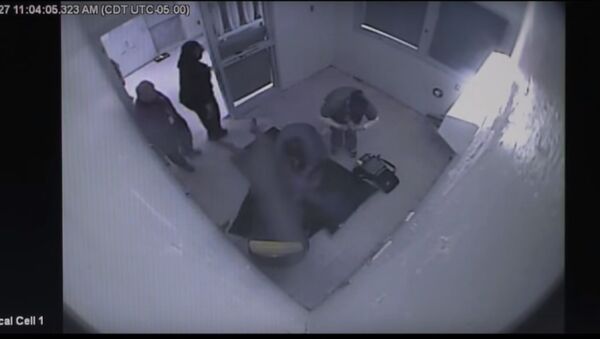According to the ruling, the events that lead to WIlliams’ death began on October 21, 2011, when his family took him to a hotel in Owasso, Oklahoma, "because Elliott had not slept in days and was having psychological issues." Williams was disconsolate over the recent breakup with his wife, and caused a disturbance at the hotel.
Williams, who had been diagnosed with bipolar disorder while serving in the military, did not comply with police and told them he wanted to die. Instead of waiting for the mobile mental health unit, Owasso officers pepper-sprayed Williams and took him to the city jail. His mental condition worsened, taking off his clothes and barking like a dog while hiding under a bench.
Officers decided they couldn’t control Williams, so they transported him to a Tulsa jail on October 22. He continued to be noncompliant, so Owasso police threw him on the floor and one officer sat on top of Williams.
Williams, in a holding cell, was not placed on suicide watch, despite his earlier pronouncements, and, after 45 minutes, he began to ram his head into the steel door before falling to the floor motionless.
Williams spent 5 days on the cell floor with three styrofoam food trays at his feet. He complained of a broken neck, and pleaded for water that he could not drink. He screamed for help but no one at the David L. Moss Detention Center would assist him. He died on his sixth morning in the cell.
U.S. District Judge John Dowdell’s judgement stated, "A reasonable jury could find that Mr. Williams’ needs were obvious to any layperson…They could also find that the medical unit-wide attitude of inhumanity and indifference shown to him, which resulted in the delay and denial of medical care in the face of his symptoms that were obviously indicative of a serious medical condition or medical emergency, amounted to deliberate indifference."
Dowdell denied motions to dismiss made by Sheriff Vic Regalado and former Sheriff Stanley Glanz, the officers implicated in the case, ruling that the video tape of Williams dying in the cell was admissible as evidence.
Dan Smolen, the attorney representing the Williams family, stated, "It’s rare that you have a set of facts that would dictate such a an emotional response…It’s one of the very few cases that shows what I would consider to be complete inhumanity. I don’t think anyone can objectively look at the facts, no matter what your religion, what your race, and argue that the way that this guy was treated was appropriate."




